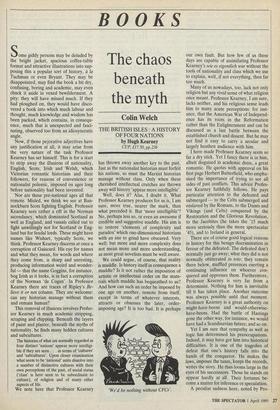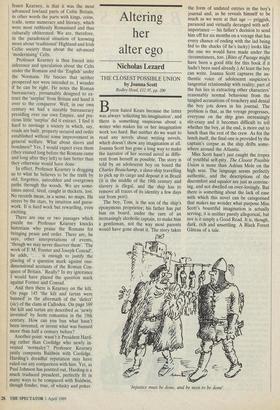BOOKS
The chaos beneath the myth
Colin Welch
THE BRITISH ISLES : A HISTORY OF FOUR NATIONS by Hugh Kearney CUP, f17.50, pp.236
Some giddy persons may be deluded by the bright jacket, spacious coffee-table format and attractive illustrations into sup- posing this a popular sort of history, a la Tuchman or even Bryant. They may be disappointed, may find the book a bit dry, confusing, boring and academic, may even chuck it aside in vexed bewilderment. A pity: they will have missed much. If they had ploughed on, they would have disco- vered a book into which much labour and thought, much knowledge and wisdom has been packed, which contains, in consequ- ence, much that is unexpected and fasci- nating, observed too from an idiosyncratic angle.
Now, if those pejorative adjectives have any justification at all, it may arise from the very nature of the task Professor Kearney has set himself. This is for a start to strip away the illusions of nationality, English, Scots, Irish and Welsh, which Victorian romantic historians and their followers, for reasons of convenience or nationalist polemic, imposed on ages long before nationality had been invented.
Nor are these pre-national ages all that remote. Misled, we think we see at Ban- nockburn Scots fighting English. Professor Kearney sees rather a rift in the Norman ascendancy, which dominated Scotland as well as England, and vassals called out to fight unwillingly not for Scotland or Eng- land but for feudal lords. These might have names like Wishart, typically Scots, we think. Professor Kearney discerns at once a corruption of Guiscard. His eye for names and what they mean, for words and where they come from, is sharp and unresting, producing information weird and wonder- ful — that the name Goggins, for instance, bog Irish as it looks, is in fact a corruption of the Norman 'de Cogan'. In Professor Kearney there are traces of Ripley's Be- lieve it or not column. They are welcome: can any historian manage without them and remain human?
This removal of illusions involves Profes- sor Kearney in much academic stripping, scraping and chipping. Beneath the layers of paint and plaster, beneath the myths of nationality, he finds many hidden cultures and subcultures.
The histories of what are normally regarded as four distinct 'nations' appear more intelligi- ble if they are seen . . . in terms of 'cultures' and 'subcultures'. Upon closer examination what seem to be 'national' units dissolve into a number of distinctive cultures with their own perceptions of the past, of social status ('class' is here seen to be subordinate to culture), of religion and of many other aspects of life.
We note here that Professor Kearney has thrown away another key to the past. Just as the nationalist historian must forfeit his nations, so must the Marxist historian manage without class. Only when these cherished intellectual crutches are thrown away will history 'appear more intelligible'.
Well, does it? Alas, I doubt it. What Professor Kearney produces for us is, I am sure, more true, nearer the mark, than what preceded it. But 'more intelligible'? No, perhaps less so, or even an awesome if credible and suggestive muddle. His aim is to restore 'elements of complexity and paradox' which one-dimensional historians with an axe to grind have obscured. Very well: but more and more complexity does not mean more and more understanding, as most great novelists must be well aware.
We could argue, of course, that reality is muddle. Is history itself in consequence a muddle? Is it not rather the imposition of artistic or intellectual order on the mate- rials which muddle has bequeathed to us? And how can such an order be imposed by one age on another, remote from itself, except in terms of whatever interests, attracts or obsesses the later, order- imposing age? It is too bad. It is perhaps `We'd be nothing without CFCs'. our own fault. But how few of us these days are capable of assimilating Professor Kearney's wie es eigentlich war without the tools of nationality and class which we use to explain, well, if not everything, then far too much.
Many of us nowadays, too, lack not only religion but any vivid sense of what religion once meant. Professor Kearney, I am sure, lacks neither, and his religious sense leads him to many acute perceptions: for inst- ance, that the American War of Independ- ence has its roots in the Reformation rather than the Enlightenment and can be discussed as a last battle between the established church and dissent. But he may not find it easy to carry a secular and largely heathen audience with him.
I have made Professor Kearney seem so far a dry stick. Yet I fancy there is in him, albeit disguised in academic dress, a great romantic. He quotes with approval on his first page Herbert Butterfield, who empha- sised the importance of trying to see all sides of past conflicts. This advice Profes- sor Kearney faithfully follows. He pays particular attention to the defeated and submerged — to the Celts submerged and enslaved by the Romans, to the Danes and Vikings (and Celts) conquered by the Restoration and the Glorious Revolution, to the Jacobites (he takes the '15 much more seriously than the more spectacular '45), and to Ireland in general.
There are of course good logical reasons in history for this benign discrimination in favour of the defeated. The defeated don't normally just go away; what they did is not normally obliterated in toto; they remain there below, muffled presences exerting a continuing influence on whoever con- quered and oppresses them. Furthermore, Professor Kearney is very far from a determinist. Nothing for him is inevitable till it has taken place. Another outcome was always possible until that moment. Professor Kearney is a great authority on might-have-beens and would-otherwise- have-been. Had the battle of Hastings gone the other way, for instance, we would have had a Scandinavian future; and so on.
Yet I am sure that sympathy as well as logic has determined his preoccupations. Indeed, it may have got him into historical difficulties. It is one of the tragedies of defeat that one's history falls into the hands of the conqueror. He makes the laws, imposes the taxes, keeps the records, writes the story. He thus looms large in the eyes of his successsors. Those he stands on appear hardly at all. Their fortunes be- come a matter for inference or speculation.
A peculiar sadness here, noted by Pro- fessor Kearney, is that it was the most advanced lowland parts of Celtic Britain, in other words the parts with kings, coins, trade, some numeracy and literacy, which were most ruthlessly Romanised and thus culturally obliterated. We are, therefore, in the paradoxical situation of knowing more about 'traditional' Highland and Irish Celtic society than about the advanced `modernising' Celts.
Professor Kearney is thus forced into inference and speculation about the Celts under the Romans and the 'English' under the Normans. He fancies that neither prospered nor were intended to. I wonder if he can be right. He notes the Roman bureaucracy, presumably designed to ex- tract the 'surplus' from Britain and hand it over to the conqueror. Well, in our own century we had a sizeable bureaucracy presiding over our own Empire, and pre- cious little 'surplus' did it extract. I find it hard to envisage a society in which, say, roads are built, property secured and order established without some improvement in general welfare. What about slaves and bondmen? Yes, I would expect even them (they existed long before the Romans came and long after they left) to fare better than they otherwise would have done.
In effect, Professor Kearney is dragging us to what he believes to be the truth by old, forgotten, untrodden and overgrown paths through the woods. We are some- times mired, tired, caught in thickets, lost. No records mean, in a sense, no maps. He steers by the stars, by intuition and guess- work. It is hard work but rewarding, even exciting.
There are one or two passages which puzzle me. Professor Kearney knocks historians who praise the Romans for bringing peace and order. There are, he says, other interpretations of events, 'though we may never discover them'. 'The work of E.M. Forster and Joseph Conrad', he adds, . is enough to justify the placing of a question mark against one- dimensional accounts of the Roman Con- quest of Britain.' Really? In my ignorance I would have placed the question mark against Forster and Conrad.
And then there is Kearney on the kilt. On page 145 'the kilt and tartan were banned' in the aftermath of the 'defect' (sic) of the clans at Culloden. On page 169 the kilt and tartan are described as 'newly invented' by Scots romantics in the 19th century. How can you ban what hasn't been invented, or invent what was banned more than half a century before?
Another point: wasn't it President Hard- ing rather than Coolidge who newly in- vented 'normalcy'? Professor Kearney justly compares Baldwin with Coolidge. Harding's dreadful reputation may have ruled out any comparison with him. Yet, as Paul Johnson has pointed out, Harding is a much traduced president, perfectly fit in many ways to be compared with Baldwin, though fonder, true, of whisky and poker.



















































 Previous page
Previous page